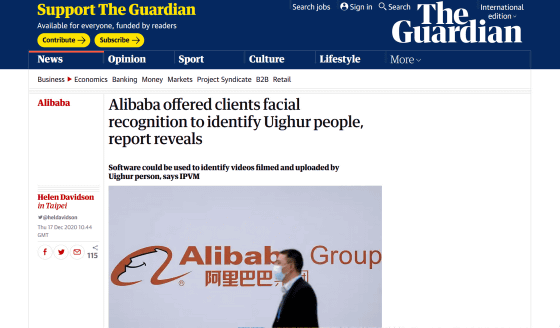It is pointed out that Alibaba provided 'a face recognition cloud service that identifies Uighurs'

China has been accused by all over the world of severely suppressing
Alibaba Uyghur Recognition As A Service
https://ipvm.com/reports/alibaba-uyghur
Alibaba's Software Can Find Uighur Faces, It Told China Clients --The New York Times
https://www.nytimes.com/2020/12/16/technology/alibaba-china-facial-recognition-uighurs.html
Alibaba offered clients facial recognition to identify Uighur people, report reveals | Alibaba | The Guardian
https://www.theguardian.com/business/2020/dec/17/alibaba-offered-clients-facial-recognition-to-identify-uighur-people

China's crackdown on Uighurs is said to be intensifying, and it has been pointed out that Uighur concentration camps are expanding rapidly, as well as severe torture and brainwashing in the concentration camps. It has been testified.
Testimony of Uighurs who experienced intense torture and brainwashing in concentration camps in China-GIGAZINE

China is also putting the latest technology in monitoring Uighurs. In December 2020, a major telecommunications equipment maker Huawei collaborated with AI giant Megvii to develop a 'Uighur alarm' that tracks Uighurs with a face recognition system, a research company based in the United States. Reported by IPVM . In response to these reports, FC Barcelona 's Antoine Griezmann , who had an advertising contract with Huawei, immediately terminated the contract with Huawei .
Confidential documents reveal that Huawei was developing a 'Uighur alarm' in collaboration with Chinese AI giant Megvii-GIGAZINE

And on December 16th, IPVM reported in a report released in collaboration with the New York Times that 'Alibaba's cloud service provided a Uighur facial recognition system.' In addition to the mail-order site, Alibaba also develops the largest cloud service in China, and the cloud service sales in 2020 are estimated to be 5.6 billion dollars (about 580 billion yen).
When IPVM investigated the Chinese version of Alibaba Cloud's API guide, it said that 'yes / nos' was listed as one of the face attributes that can be detected by the face recognition system. You can see the sentence 'Weizu: is it Uyghur' in the image below, which is a Google translation of the Chinese version of the API guide.

The facial recognition system that was mentioned for Uighur detection is described in the API guide as part of Alibaba's 'Cloud Shield' solution. Cloud Shield is a service that can be used to monitor content on the Internet, and it detects and recognizes text, photos, videos, and sounds that include 'pornography, politics, violent terrorism, advertising, and spam.' In addition, the English version API guide of the cloud service does not mention the function of 'detecting the face of Uighurs', and it seems that this function is likely to work only in China.
IPVM removes content by identifying that the facial recognition system is 'Uighur' when Uighurs post photos or live stream on websites with Alibaba's Cloud Shield. Pointed out that it can be done. Alibaba's cloud services are used on various websites and platforms in China, although no Uighur content has actually been removed by Cloud Shield.
When IPVM and the New York Times asked Alibaba for comment on the face recognition system that identifies Uighurs, the API guide that mentions the Uighur identification function was deleted. Alibaba insisted on IPVM and the New York Times that 'Uighur facial recognition systems were used only in test environments, not in externally deployed services.'
However, Alibaba did not provide evidence that 'the Uighur facial recognition system worked only in a test environment' and did not explain why the unimplemented features were listed in the official software guide. Alibaba also argued that 'racial / ethnic discrimination or profiling is against Alibaba's policy,' but IPVM asked why 'why did we test the system to identify Uighurs?' He points out that he did not explain.

by Evgeni Zotov
In addition, IPVM reported that Chinese cloud provider Kingsoft Cloud , like Alibaba, introduced a 'system for identifying Uighur faces' on its website. Kingsofft Cloud responded to this statement by claiming that racial labeling was inconsistent with Kingsofft Cloud's policy and that the tool in question was not sold to customers.
IPVM said, 'It is well documented that Chinese police are using'Uighur alerts' in their video surveillance systems. Alibaba provides this apparently racist technology to its vast cloud customers. What we are doing shows that the Uighur crackdown extends far beyond law enforcement. '
Related Posts:
in Software, Posted by log1h_ik





